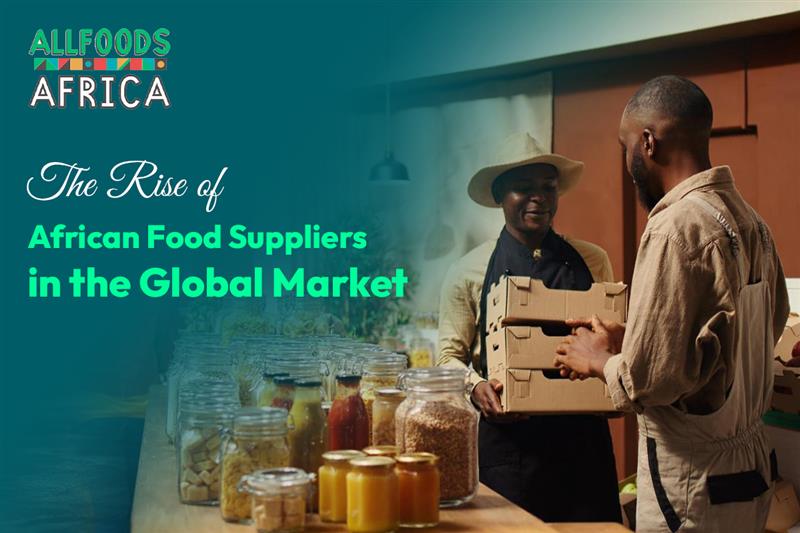
The Rise of African Food Suppliers in the Global Market
Share
Introduction
African cuisine used to be considered niche, but its bold taste and positive health impact have launched it into global mainstream fame. African suppliers and farmers are expected to get access to a one trillion dollar global market by 2030. Africa is the largest producer of food worldwide. With access to proper technology and farming equipment, African farmers and suppliers will have the edge to dominate the food market globally. Currently valued at 313 billion dollars, the numbers could triple if the government could collaborate with business leaders, farmers, and suppliers to create a proper African goods store system.
Global Demand for African Cuisines
African cuisines are gaining traction in the culinary industry, and their popularity is rapidly rising. African cuisines are valued for their bold and punchy flavours, sustainable farming practices, and nutritional value. Multiple factors that contributed to this phenomenon include economic growth, increased urbanization, and social media penetration. Here is a more detailed look:
Economic Growth and Urbanization
Africa has been growing its economy rapidly over the past couple of decades, owing to population growth, infrastructure spending, proper education, and foreign investment. Economic growth has ushered in increased urbanization and access to growth and wealth generation. Africans have more consumer power and disposable income for consuming products and expanding their business elsewhere. Also, the global economy has expanded, and thus, more and more people want to try exotic cuisines.
Social Media Penetration
Social media penetration is also responsible for the rise in demand for African cuisines and thus benefiting suppliers. Multiple social media channels, especially on Facebook and YouTube, have promoted African cuisines throughout the world. The rise in popularity has given flame to the fusion trend of blending African cuisines with Western recipes. Such fusion dishes have a broader appeal among the Internet audience.
Cultural Significance
The African diaspora in the most valuable consumer markets, such as Europe and North America, has increased throughout the 21st century. Pockets of African immigrants in these areas have found community in celebrating African cuisines and culture. It is now easier to buy African spices and other ingredients through an African goods store. Africa has also improved its tourism infrastructure and thus spread its cuisines and culture.
Increased Food Security
Africa has unexplored and uncultivated lands that can be used for agricultural purposes. It poses significant opportunities for increasing food production. Increased food security for the population leaves room for exporting food ingredients in large quantities. African foods are also healthy and have nutritional value. Thus, demand for African cuisines has skyrocketed amidst conversations of climate change.
African Food Suppliers: Role in Economic Development
Africa has 50% of the world’s uncultivated lands, leading to food deficiency. Most of the crops grown in Africa do not yield their full capacity. Perishable crops form the majority, and the yields go to waste without proper storage infrastructure. African food suppliers are filling the gaps to create a sustainable supply chain mechanism to fulfill the demand and bolster economic growth.
Job Creation
Africa has the potential to create jobs through the food suppliers in sectors such as logistics, transportation, and distribution. Governments across the nations need to invest more in infrastructure, climate change research, and storage facilities. Experts suggest that private and public partnerships can evolve into a beneficial strategic alliance for the farmers and suppliers.
Resilience and Sustainability
Strengthening local food supply chains and the African goods store system will help African farmers fight the impact of climate change. African suppliers have helped empower the local food distribution system to combat food waste, thus saving deforestation for agriculture. African suppliers can also create communities to address issues faced by farmers during natural disasters.
Technological Integration
African food suppliers can help with proper technological integration in the food distribution system. Technological integration includes Inventory management, logistics, better farming equipment and materials, and storage systems. Suppliers can help local farmers scale their products to far-reaching markets, especially to international, valuable consumer markets, through proper technological implementation.
Supermarket Chains
Food suppliers can be the bedrock for supermarket chains, which are formalized food distribution systems. Supermarket chains can provide technical support, better infrastructure, and labor power to the farmers and other suppliers. However, fairness and transparency are essential to build a trustworthy relationship between the farmers and suppliers.
Roadblocks for African Suppliers: Challenges in Scaling
Infrastructure Deficiencies
African food suppliers suffer from a tremendous infrastructure deficiency. An unreliable transportation system is one of the most prominent concerns. Poor road connectivity is also a major hindrance to food distribution. These infrastructure problems create a lag in deliveries and increase costs. There are also shortages of energy supply and a deficiency in digital infrastructure.
Market Fragmentation
The African continent is immensely diverse, with numerous ethnic groups, languages, and religions inhabiting it. Their preferences, tastes, and sensitivities vary; thus, market segmentation presents a challenge. Different countries sharing borders have different regulations. These problems create issues for logistics and transportation.
Conclusion
Despite the challenges that African countries face, the food supply system is getting stronger. Africa has the potential to become the largest food producer in the world. It needs capital investment, technological integration, and better legal and physical infrastructure. With the help of African food suppliers, farmers can expand their reach worldwide, fight climate change, and eradicate food insecurity. Global consumers also have the opportunity to experience exotic food and experiment to create new dishes.
